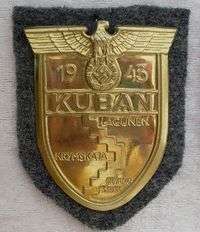Kuban Shield
| Kuban Shield Ärmelschild Kuban | |
|---|---|
 | |
| Awarded by Nazi Germany | |
| Type | Badge |
| Eligibility | Military personnel |
| Awarded for | fighting at the Kuban bridgehead between February and October 1943 |
| Campaign | World War II |
| Status | Obsolete |
| Statistics | |
| Established | 21 September 1943[1] |
| Distinct recipients | Approximately 145,000 |
The Kuban Shield (German: Ärmelschild Kuban) was a World War II military decoration of Nazi Germany, awarded to those who fought at the Kuban bridgehead in the Soviet Union from February 1943 until it was abandoned in October 1943. The award was instituted on 21 September 1943.[1]
Design
The shield is designed in a similar fashion to the Crimea Shield and was struck in sheet metal or zinc and treated with a bronzed wash. It features a German eagle with outstretched wings clutching a laurel wreath with a swastika. On each side the wreath are the numbers 19 and 43. Directly below the eagle is written KUBAN in capital letters. Below this name is a stylized map of the Kuban region, with a line representing the defensive line that the men fought to preserve with the location of the bridgeheads - KRYMSKAJA, LAGUNEN, and NOWOROSSIJSK.[1]
The shield was worn on the upper left sleeve of the tunic. A back plate, which held in place a piece of cloth matching the recipients’ branch of service, was applied to the shield:
Criteria for award
The criteria for award of the shield to military personnel:[1]
- Served in the bridgehead for 60 days; or
- Been wounded while defending the bridgehead; or
- Had been engaged in a single major operation at the bridgehead
See also
Notes
- 1 2 3 4 Angolia 1987, p. 284.
References
- Angolia, John (1987). For Führer and Fatherland: Military Awards of the Third Reich. R. James Bender Publishing. ISBN 0912138149.